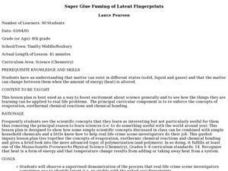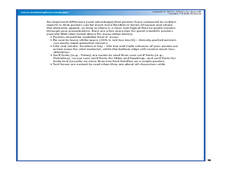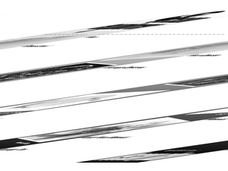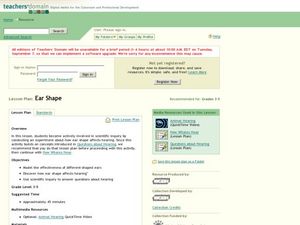Curated OER
Super Glue Fuming of Latent Fingerprints
Students explore latent fingerprinting. They observe a supervised demonstration of the process that real-life crime scene investigators sometimes use to identify latent fingerprints. In addition, they brainstorm ways to improve the...
Curated OER
The Mechanisms of Decay and Decomposition
Eighth graders study how all living things die. They are introduced tot he life cycle and the concept of an ecosystem. Students have a introductory exposure to trophic levels (producer-consumer-decomposer) in the environment.
Curated OER
Fingerprints
Students analyze their fingerprints. In this fingerprint lesson, students make prints and observe the patterns for arches, loops, and whorls. They write a brief autobiography about themselves titled "I'm Thumbody."
Curated OER
Magnify That
Students observe many different objects using a magnifying lens. In this magnification lesson plan, students learn that scientists use different tools, and they use the tool to magnify objects in the classroom to see objects in better...
Curated OER
Fly Tying
Learners practice fly tying and explain water conservation efforts in Iowa. In this ecology, Iowa geography, and natural resources lesson, students identify basic equipment and material needed to fish, then tie flies. Learners name...
Curated OER
Hero Or Zero?
Students investigate science and technology by reading a children's book. In this reading comprehension instructional activity, students read the story Archibald Frisby and discuss the ways we use science and technology in everyday...
Curated OER
A Bioluminescent Gallery
Students examine the different types of luminescence in deep sea organisms. In this bioluminescence lesson, students investigate how color and light aide deep ocean organisms by describing the characteristics of the habitat and...
Curated OER
Let's Hit the Slopes!
Students study benthic communities in the Gulf of Mexico and explain their roles. In this investigative lesson students participate in a group activity and study how to calculate and index of biological communities.
Curated OER
Where's the Oxygen?
Students study seawater and how temperature and salinity influence it. In this oxygen lesson students complete a lab activity on dissolved oxygen.
Curated OER
What's So Special?
Students study the biology and morphology of Lophelia corals. In this investigative lesson students explain how the coral contributes to communities, and create a poster.
Curated OER
Distant Relatives
Students investigate observations between widely separated populations of anchialine cave fauna. In this biogeography lesson students discuss theories that could explain the given observations.
Curated OER
To See or Not to See
Students identify and discuss key factors that determine how effective color camouflage is in certain habitats. In this investigative lesson students divide into groups and study light.
Curated OER
Aging of Trees
Students examine tree rings to determine its age. In this tree ring lesson, students examine core tree samples, identify the tree rings, and then determine its age. Students complete a worksheet, deciding which of the two core sample is...
Curated OER
Archery
Learners study archery. In this archery lesson, students develop basic archery and hunter safety skills. Learners discuss the history of archery and bow hunting.
Curated OER
Basic Orienteering
Students study orienteering. In this science instructional activity, students study the parts of a compass and use the compass to set a bearing and follow the bearing on the compass.
Curated OER
Canoe and Kayak
Students explore canoes and kayaks. In this canoe and kayak lesson, students research the history, parts, and sport of the canoe and kayak. Students then practice how to use a paddle for each boat, and go on a field trip in order to use...
Curated OER
Looking into the Past (Archaeology)
Students discover how to be an archaeologist. In this archaeology lesson, students research the basic information about an archaeologist. Students then observe different artifacts and learn what questions to ask in order to discover the...
Curated OER
Observation Hike
Young scholars participate in an observational hike to study the natural surroundings. In this observational hike lesson, students hike through a state park and observe the plant and animal life. Young scholars learn about appropriate...
Curated OER
Owl Pellet
Students discover an owl's diet. In this animal science lesson, students observe owl pellets, determining what the owl ate. Students put together the owl's food chain, after determining the animals in the owl's diet.
Curated OER
Special Place
Pupils observe and describe a "special place" chosen along a nature trail. For this habitat observational skills and writing lesson, students take a walk on a nature trail and choose a spot to sit and meditate. Pupils complete a...
Curated OER
Animal Adaptations: Focus on Bird Beaks
Sixth graders explore bird beaks as animal adaptation. In this bird adaptation lesson, 6th graders conduct an experiment to determine the connection between the shape of a bird's beak and the food it eats.
Curated OER
Ear Shape
Students explore hearing. In this hearing and sound activity, students participate in a scientific inquiry to compare ear shape and hearing ability. Students work with a partner to listen to soft music and use various materials to...
Curated OER
Animal Tracks
Students study animals. In this science lesson plan, students make plaster casts of animals that live in the area. Students identify the tracks.
Curated OER
Carmaleetas
Students identify the relationship between predator and prey in the food chain. In this food chain lesson plan, students work in groups and play a predator and prey game. Students discover what happens when a predator does not find prey.

























